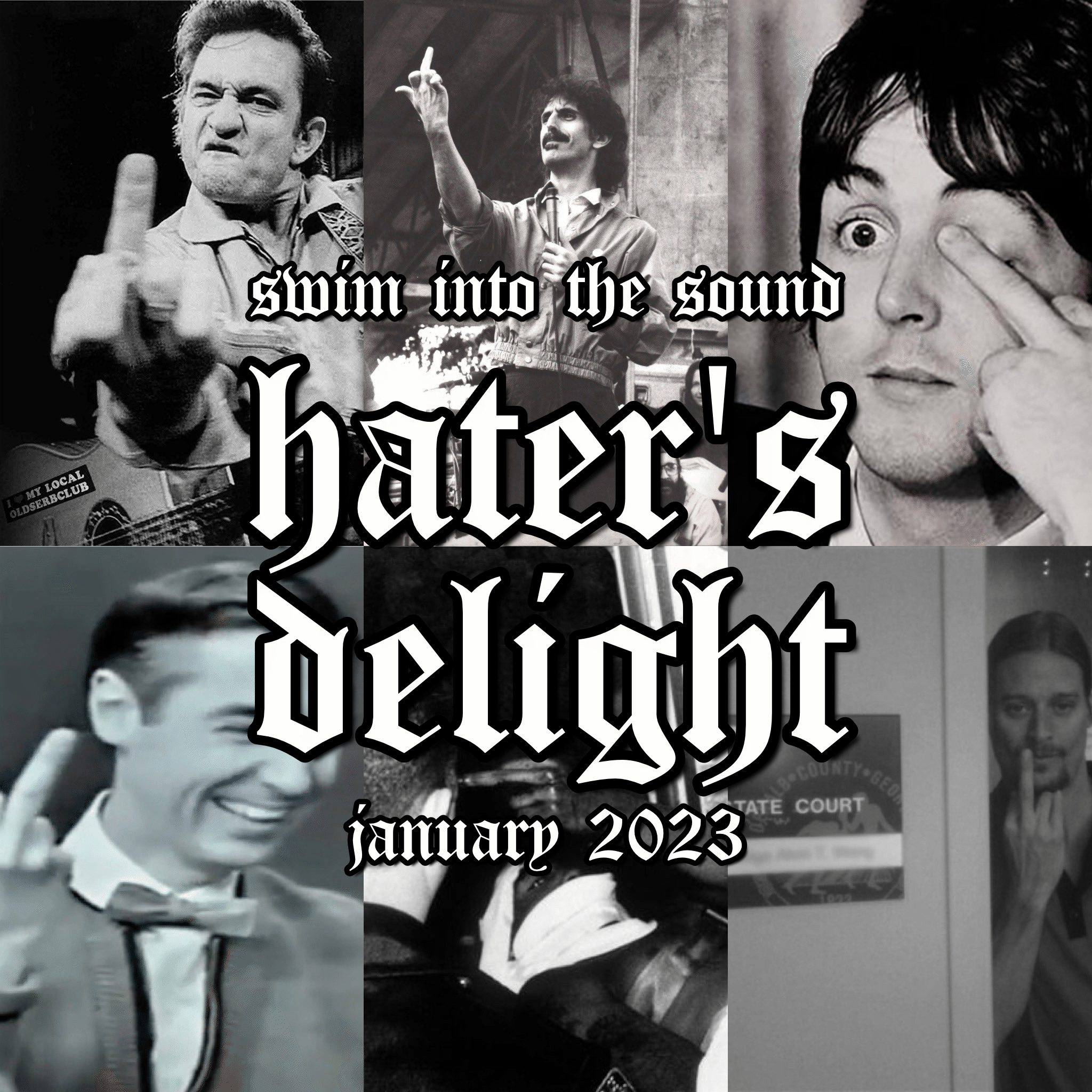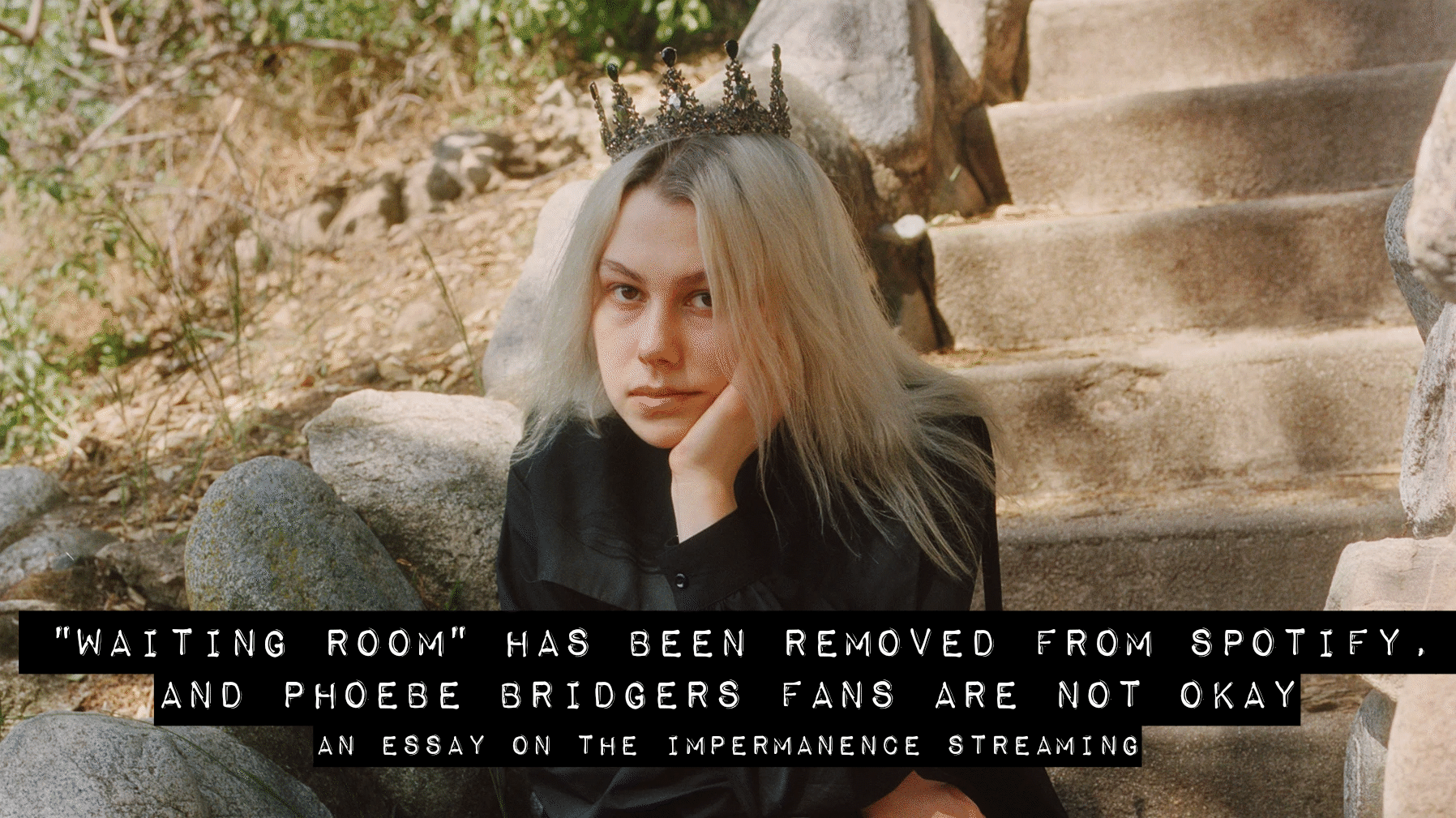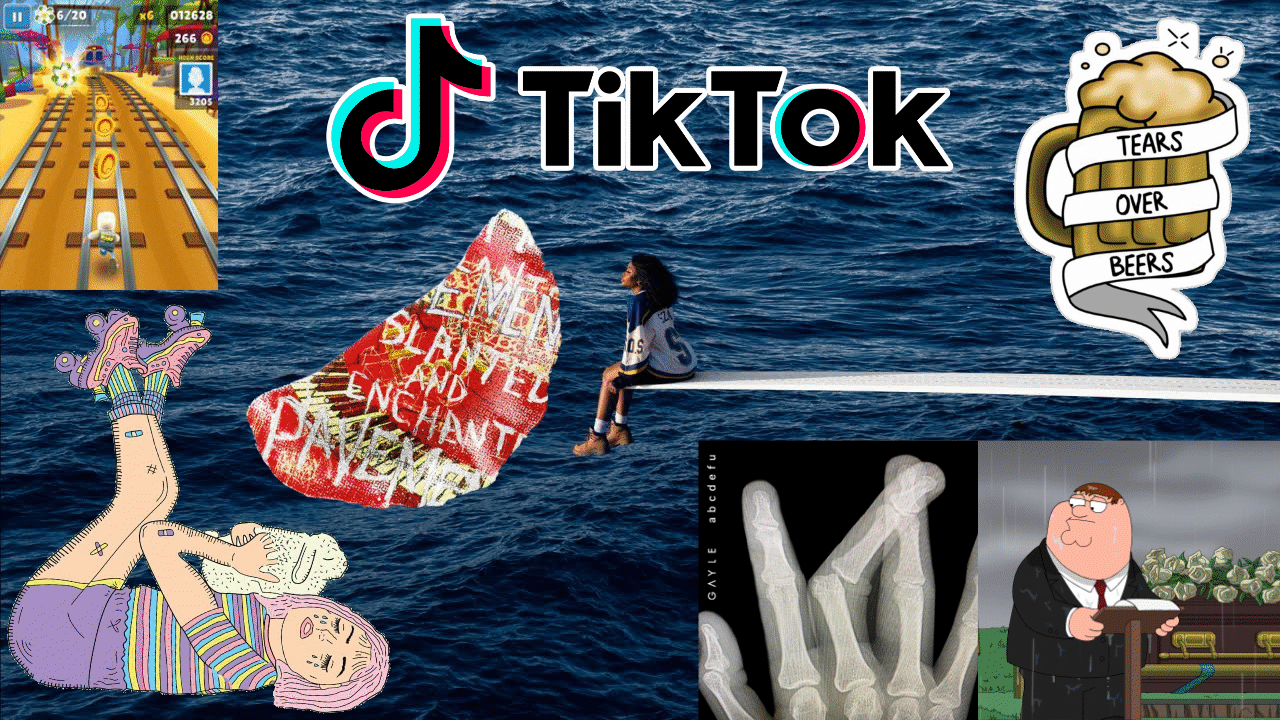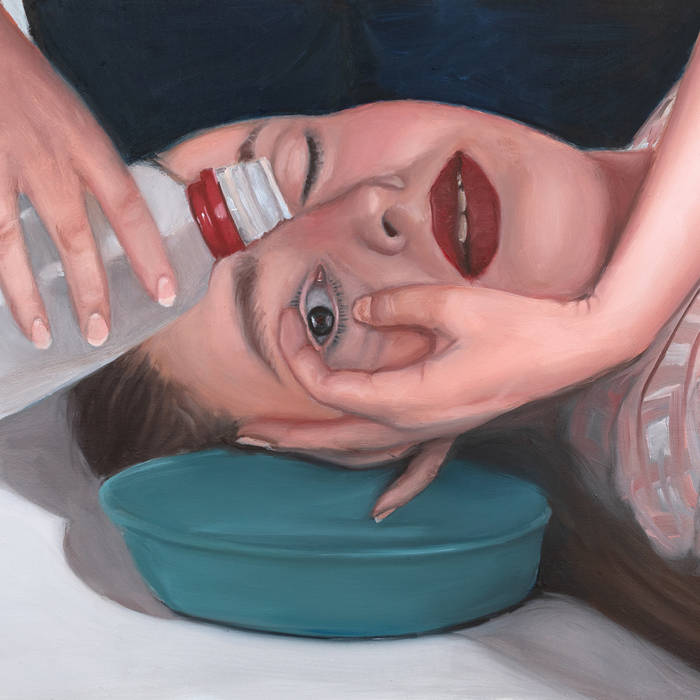Hater's Delight – January 2023
/For a traditionally slow time of year, January has already been a whirlwind month of new music, announcements, and discourse. The return of boygenius, the promise of Wednesday, the long-awaited album from Fireworks. All of this and lots to look forward to in the coming months… but those are all good things, and we can’t be all positive all the time.
Enter Hater’s Delight, a micro-review column brought to you by Swim Into The Sound writers who want to vent about the things online and in music that have gotten under their skin over the past month. While I am a firm believer in love and positivity, even I admit that sometimes you just gotta let the Hater Energy out, and that’s exactly what this is.
If you want to catch up with a comprehensive playlist of all the new releases I liked this month, click here. If not, read on for the dregs of January.
The Album Art for The National’s First Two Pages of Frankenstein
From the moment I saw the album art for First Two Pages of Frankenstein, I knew exactly what it reminded me of right away. It looked like the album art for every car commercial indie/alternative band of the 2010s. While The National haven’t always had the best album art, this one feels different. When I look at this album art, this could easily be the art for any of the following bands: Walk the Moon, Cold War Kids, Grouplove, American Authors, Cage the Elephant, Twenty One Pilots, Fitz and the Tantrums, X Ambassadors, lovelytheband, Passion Pit, American Authors, Young the Giant, The Temper Trap, The Naked And Famous, Miike Snow, Foster the People and so much more. Now, why does this album art remind me of all these bands? I can’t tell you. I’m not a graphic designer, and my attempts at art in the past I would consider to be failures. But you just know it when you see it, and God, do I see it in all its blinding glory.
Matty Monroe – @MonrovianPrince
Jack Antonoff’s Enemies
Dig this– an Instagram story showing Jack Antonoff and Michelle Zauner of Japanese Breakfast sparked outrage on January 1st from “stans,” to which I can only respond: Let him cook. Antonoff has been working with your self-professed “favs” for years before he made one lackluster LP with Lorde. Melodrama is great. 1989 is great. Norman Fucking Rockwell, while not for me, is still Lana Del Rey’s best record beyond a shadow of a doubt. Hell, I’ll even go to bat for both Bleachers and fun. Both are great indie pop bands who produced multiple good records with generally slick production that retained indie (analog?) charm in ways Antonoff’s other, poppier work can’t or won’t. The man’s discography is longer and more star-studded than any seething 14-year-old’s Tweet history, so get off his back, capiche?
Mikey Montoni – @dumpsterbassist
Kim Petras ripping off SOPHIE
Earlier this month, Kim Petras posted a Tiktok of her showing Meghan Trainor a clip of her recent song, and many were quick to point out the resemblance between the audio Petras played and the sound textures of the late transgender music icon SOPHIE. It’s appalling when any artist is ripped off without credit, but this feels especially unjust and painful. I already was a Kim Petras hater for her defense of abuser Dr. Luke. And Meghan Trainor’s presence… bewildering, and frankly insulting. Hate hate hate to see it!
elizabeth handgun – @OneFeIISwoop
“Sad Girl” as a Subculture/Identifier/Genre Descriptor
If you listen to an artist whose thematic and sonic palette is as emotionally expansive as that of Mitski or Fiona Apple or any member of boygenius, and all you have to say about their work is “more music for the sad girlies to cry to 😭” you’re not really saying anything. It’s a regressive way to talk about music made by female artists (though the term isn’t entirely gender-exclusive– songwriters like Elliott Smith, Sufjan Stevens, and Alex G are no strangers to the “sad girl starter pack” playlists that have swarmed your Spotify algorithm like a plague of locusts). In reality, “sad” tells us almost nothing about the music itself and only encompasses a tiny fraction of the vast emotional landscapes that these artists create. When you fail to engage with their art fully, you’re disrespecting the work of musicians you claim to care about AND cheating yourself out of a more enriching musical experience. Or, as Mitski herself put it in words far more succinct and less pretentious than mine, “sad girl is OVER!” So get over it.
Grace Robins-Somerville – @grace_roso
Mosh or be Moshed: Hardcore vs. TikTok
Look, whether you’re on the outside or part of the scene, some elements of hardcore music are supremely stupid. Whether it’s standard pit karate, sitting on the stage mid-set, or literally hurling a TV at other patrons. The discourse of “don’t talk about hardcore if you’ve only been in it for a few years” is ridiculous. I met up with someone at FYA (Fuck Your Attitude, Tampa’s yearly kickoff of hardcore fests) who had only been into hardcore for a year and a half who told me this was his fifth(!) festival experience. So there’s no need to gatekeep. On the other side, if you’re a young internet person looking to comment on every subculture you refuse to research, you’re not helping either. As the new and not-quite-yet overdone Kevin Hart meme goes, take yo sensitive ass back to the B9 boards.
Logan Archer Mounts – @VERTICALCOFFIN
(Sped Up Version)
Hey pop artists? Stop it with the sped-up versions of your songs. I might risk sounding like an old fart, but I just don’t get it. This trend feels like the musical equivalent of those Family Guy Subway Surfer Stimulation TikToks. It feels like rapid consumerism combined with ADHD to bring our collective attention spans down to zero. I know they’re sometimes funny or fitting for a TikTok, but why someone would go out of their way to listen to a Chipmunk version of a pop song is beyond me. More ranting on this here.
Taylor Grimes – @GeorgeTaylorG
Complaining About Your Favorite Artist Changing Their Sound
In Big Magic, Elizabeth Gilbert writes that “pigeonholing is something people need to do in order to feel that they have set the chaos of existence into some kind of reassuring order.” That’s all to say that I hate when people rip artists for experimenting with different sounds. I was a Fall Out Boy fan before their hiatus and have not connected with them since they reunited, but if someone enjoys whatever genre they’re trying on, kudos to them. Max Bemis of Say Anything was (understandably) all over the place throughout the band’s discography, but his art intrigues me regardless of whether I found it good or bad. Who knows how many times I’ll listen to the latest Fireworks album, but I’m glad that they are releasing music again, and I will listen to whatever they put out at least once just because their music has connected deeply with me already. If people enjoy listening to music so much, why are so many of us pigeonholing the artists that pleasantly surprise us with what they create? Expand your palettes, embrace change.
Joe Wasserman – @a_cuppajoe
Rick Rubin’s Production
When I was 15 years old, my favorite bands were System of a Down, Red Hot Chili Peppers, and Weezer. I read Rolling Stone magazine and watched VH1’s I Love the 90s. I didn’t have any sort of high-speed internet, and would mostly use my dial-up connection to browse Wikipedia and read about the bands I loved. With this limited perspective, it was easy to think Rick Rubin was the greatest record producer who ever lived. And ya know, maybe he is the greatest record producer—if you are a 15-year-old boy. In a recent interview with Anderson Cooper on CBS’s 60 Minutes, Rick Rubin stated, “I know nothing about music,”—31-year-old me is inclined to agree.
Russ Finn – @RussFinn
Show Photographers
The most annoying thing that has happened post-COVID lockdown has been an influx of concert "photographers." These people decided to take up the hobby and, in turn, take up the entirety of the front row and even most of the stage during shows. Now don't get me wrong, I'm glad people are documenting shows and taking pictures and such, however, I am BEGGING all of you to learn how to use your flash appropriately. What really created this level of hatred and anger for me were two shows in particular; Portrayal of Guilt with Graf Orlock at Que Sera in Long Beach, and INFEST at 7CMC in Denver. The INFEST show makes sense, right? Like legends are playing a DIY space, you gotta take some pictures, but when you climb the PAs and take up stage space just so you can get your shots and don't even participate in the show, I feel like there's something lost there. Now the Que Sera show— that one was maddening. They didn't even need to turn the lights on because of the constant flashes from cameras during the entire show. In short, respect the concertgoers’ experience as well, and don't be a fucking tool just because you bought a film camera over the pandemic.
Chris M – @sngs_abt_grls













